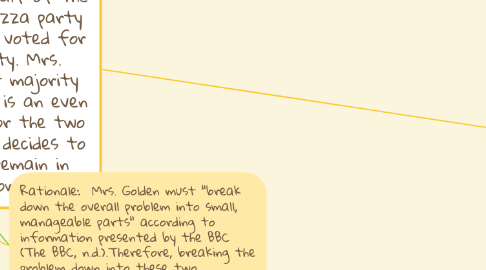MEDT 7465 Computational Thinking Flow Chart Problem: Mrs. Golden's first grade class earns a reward for reaching their reading goal. Half of the class voted for a pizza party while the other half voted for an ice cream party. Mrs. Golden stated that majority rules, however there is an even amount of votes for the two options. Mrs. Golden decides to do both and still remain in budget but how ?
by Eboni Golden

1. Curzon, P., Dorling, M., Ng, T., Selby, C., & Woollard, J. (2014, June). Developing computational thinking in the classroom: A framework. Computing At School. https://westga.view.usg.edu/content/enforced/2332653-CO.540.MEDT7465.51263.20221/DevelopingComputationalThinkingInTheClassroomaFramework.pdf?_&d2lSessionVal=p2Jjrp3It7Hd9E2FbdllaZVdZ&ou=2332653 The BBC. (n.d.-a).What is an algorithm? - Algorithms - KS3 Computer Science Revision. BBC Bitesize. Retrieved July 8, 2021, from https://www.bbc.co.uk/bitesize/guides/zpp49j6/revision/1. The BBC. (n.d.-b). What is decomposition? - Decomposition - KS3 Computer Science Revision. BBC Bitesize. Retrieved July 8, 2021, from https://www.bbc.co.uk/bitesize/guides/zqqfyrd/revision/1. The BBC. (n.d.-b). What is decomposition? - Decomposition - KS3 Computer Science Revision. BBC Bitesize. Retrieved July 8, 2021, from https://www.bbc.co.uk/bitesize/guides/zqqfyrd/revision/1. The BBC. (n.d.-c). What is pattern recognition? - Pattern recognition - KS3 Computer Science Revision. BBC Bitesize. Retrieved July 8, 2021, from https://www.bbc.co.uk/bitesize/guides/zxxbgk7/revision/1
2. Algorithms: Mrs. Golden purchases a gallon size of neapolitan ice cream. She serves each students who wants ice cream 1 scoop. She also orders a large pizza and requests that the slices are double cut. This doubles the quantity of pizza. Ordering one of each item allows for all students to get the reward they desired without Mrs. Golden going over budget.
3. Abstraction: Mrs. Golden chooses to filter some of the similarities and focus on increasing her quantity by making her serving sizes smaller. For example, instead of using a gallon of ice cream for every 10 kids because she chooses to give two scoops, she can serve 20 students with one scoop each. This will allow for students to get ice cream and pizza if they like.
4. Pattern Recognition: Mrs. Golden realizes that all students are interested in consuming something. She also notices that both choices allow for unstructured down time and social interactions. Lastly, she notices that both party options include dairy and that the quantity of an item can be adjusted by making the serving size smaller.
5. Decomposition: Mrs. Golden must first present a party that is inclusive of all students since it was the entire class who earned the reward. She must also honor her words that "majority rules." She also has to order two different dish request while not going over her allotted budget.
6. Rationale: In research from The BBC (n.d.-a) algorithm thinking identifies the instructions and generate a plan to solve the problem. In this scenario, Mrs. Golden creates a plan to keep her word and satisfy all students.
7. Rationale: In research from Curzon et al. (2014) it was stated that abstraction allows for thinkers to remove insignificant details to "remove unnecessary complexity." By filtering out the other similarities within the pattern Mrs. Golden noticed as well as ignoring the other small problems she found, she is able to focus on the bigger picture.
8. Rationale: Finding similarities in this scenario allows for Mrs. Golden to further analyze and solve the problem efficiently according to the BB (The BBC, n.d.-b).
9. Rationale: Mrs. Golden must "break down the overall problem into small, manageable parts" according to information presented by the BBC (The BBC, n.d.).Therefore, breaking the problem down into these two components allows for her to manage the overall issue.


